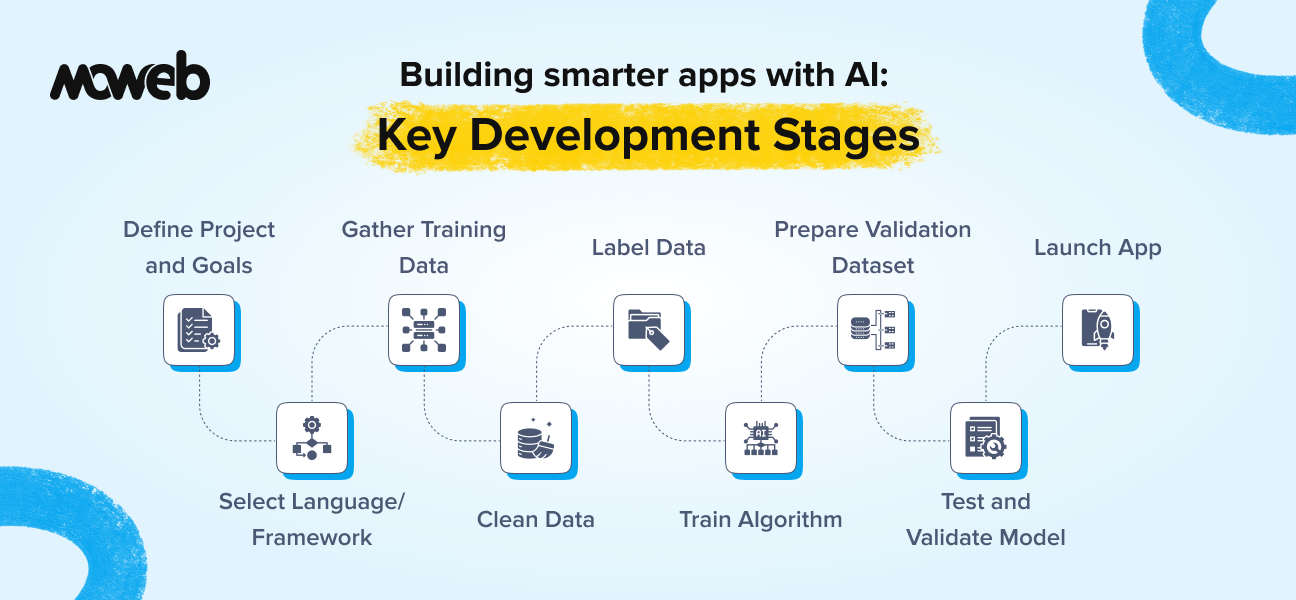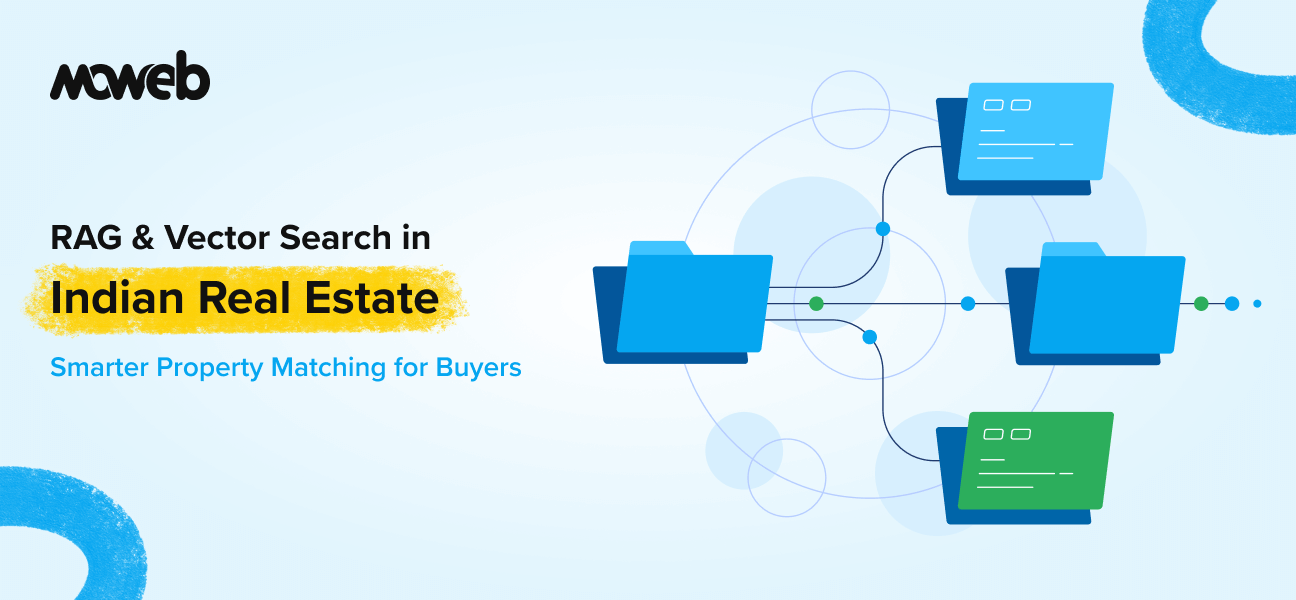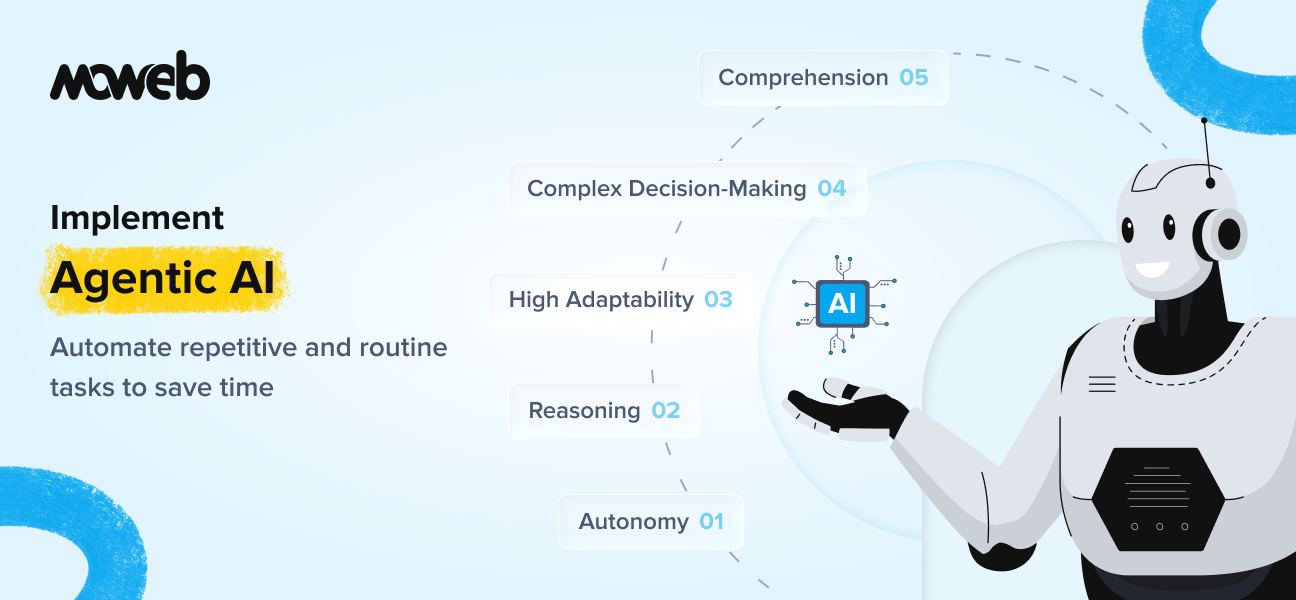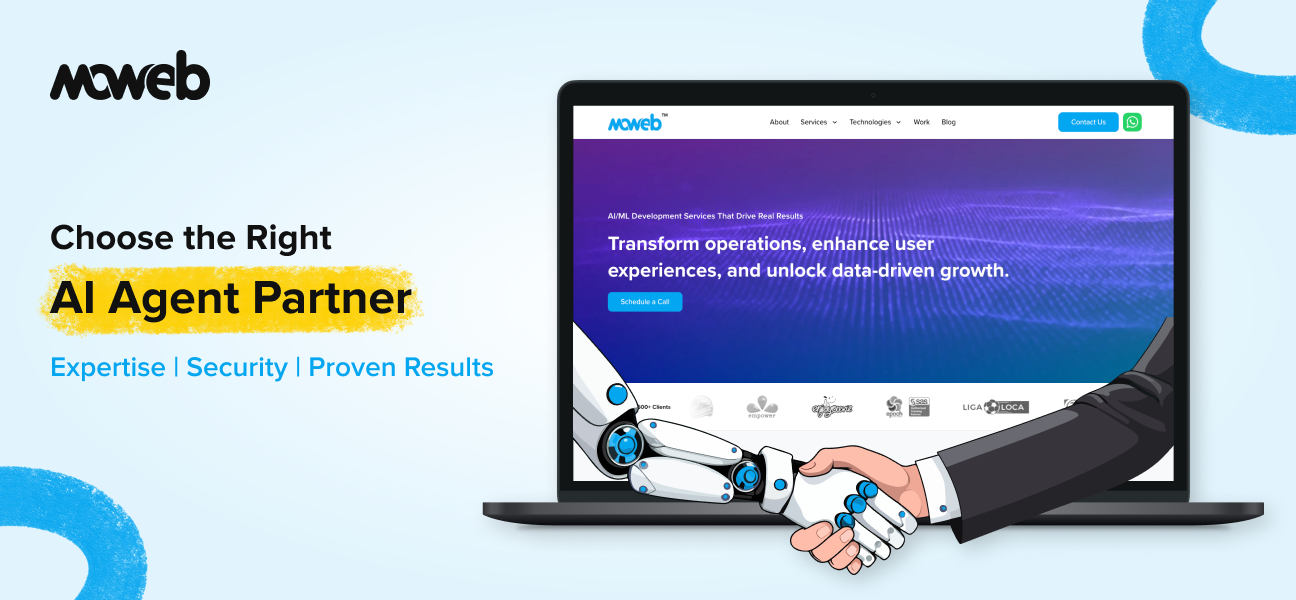
AI has evolved from a futuristic buzzword to an everyday necessity. It is no longer confined to high-tech laboratories or robotic development. It is now being used in the mobile applications we use daily. Be it a fitness app that predicts your ideal workout, a personal assistant that learns your routines, or an industry tool that automates data-driven decisions.
For businesses, the question is no longer “Should we use AI?” but rather “How fast can we integrate it?”. Companies are investing in artificial intelligence applications to cut costs, enhance personalization, automate workflows, and gain an edge over others. That’s why knowing how to build AI apps from scratch can be a career-defining skill for developers and a transformative opportunity for businesses.
So, if you’re wondering how to make an AI app that truly adds value, keep reading.
What Separates an AI App Development from a Regular App Development
At its core, the difference between a traditional app and an AI-powered one is simple: learning and adaptability. Traditional apps follow rules you hard-code. AI apps, on the other hand, interpret patterns, learn from data, and adapt dynamically.
For example, Netflix doesn’t just “stream,” it is an AI engine that powers recommendation systems that drive 80% of watched content. Similarly, Spotify, Tesla Autopilot, and ChatGPT are benchmarks of how AI app development redefines user experience.
| Feature | Traditional App | AI App |
| Functionality | Rule-based | Data-driven, adaptive |
| Learning | None, follows fixed code | Learns from patterns & feedback |
| Personalization | Limited | Hyper-personalized recommendations |
| Data Usage | Static datasets | Dynamic, real-time inference |
| Examples | To-do list, calculator apps | ChatGPT, Snapchat filters, fraud detection |
Moweb Expertise in Developing Premium AI Applications
At Moweb, we are not just a mobile app development company; we’re an AI development company helping businesses leap into the future with intelligent apps tailored for their industry. Our AI services include:
- Custom AI Solutions
- Machine Learning Models
- Data Analysis & Processing
- Predictive Analysis
- Natural Language Processing (NLP)
- Computer Vision
- Robotic Process Automation
- Autonomous AI Agents
- Low Code/No Code Platforms
- Agentic AI Solutions
- Retrieval-Augmented Generation (RAG) & Agentic RAG
- Vector Database Integration
- Data Science & Predictive Analytics
- Generative & Conversational AI
- Intelligent Automation & AI Agents
- AI Consultation
Industry-Centric AI Solutions
- Entertainment & Media: Automate content creation, tailor recommendations, and enable dynamic video/audio personalization with Generative AI and advanced media platforms.
- Marketing: Optimize campaigns, personalize outreach, and predict customer behaviors using data-driven analytics and AI-powered automation.
- Retail and eCommerce: Enhance customer experiences with AI-based product recommendations, smart inventory management, and real-time sales forecasting.
- Manufacturing: Increase operational efficiency and product quality by deploying computer vision for defect detection, predictive maintenance, and automated workflows.
- Sports: Analyze performance, deliver instant insights, and enrich fan engagement with AI-driven video analytics and personalized experiences.
- Logistics & Transportation: Streamline operations and improve supply chain visibility with predictive analytics, route optimization, and real-time resource tracking.
- Finance and Banking: Accelerate fraud detection, automate compliance, and provide personalized financial services through machine learning and intelligent automation.
- Healthcare: Advance diagnostics, automate administrative tasks, and personalize patient care using predictive modeling and AI-powered virtual assistants.
- Real Estate: Simplify property management, automate pricing models, and visualize urban environments through digital twins and AI-driven analytics.
- Gaming: Create adaptive gameplay, generate dynamic environments, and personalize gamer experiences using machine learning and generative content engines.
- Immersive & AR/VR: Deliver hyper-realistic interactions, power spatial mapping, and enable lifelike avatars with AI-enhanced XR and real-time computer vision systems.


Ready to Unlock AI for Your Business?
Contact us to get a personalized quote and start building your custom AI solution today!
Moweb’s practices & principles center on building AI solutions that balance innovation with responsibility. We prioritize ethical AI development, ensuring transparency and unbiased modeling at every step. By following agile methodologies and an MVP-first approach, we accelerate delivery while minimizing risks.
Our teams focus on scalable, future-proof deployments using best-in-class tools and cloud technology, combined with robust monitoring and continuous improvement. With Moweb, you can expect tailored solutions engineered for real-world impact, reliability, and ongoing adaptability.
Understanding AI App Development: Key Concepts
What is an AI App?
An AI app is a digital solution designed to intelligently analyze data, learn from patterns, and deliver dynamic AI-powered user experiences. These apps leverage technologies like Machine Learning, Natural Language Processing (NLP), Computer Vision, and Generative AI to move beyond traditional rule-based automation, enabling smart decisions, personalization, and real-time adaptation.
Types of AI Applications
- Conversational AI: Apps such as chatbots and virtual assistants use NLP and ML to understand conversations, answer questions, and provide human-like support (e.g., Replika or Alexa).
- Predictive Analytics: AI apps use pattern recognition to forecast sales, predict healthcare outcomes, or anticipate market changes, helping businesses and professionals make informed decisions.
- Computer Vision: Solutions powered by computer vision interpret images and videos, driving use cases like facial recognition and AR filters as seen in apps like Snapchat.
- Generative AI: These tools produce new content, generating text, images, or code through advanced models such as ChatGPT and DALL-E.
Core Components of AI
- Machine Learning (ML): Algorithms that allow apps to learn from data and improve over time.
- Neural Networks: Systems inspired by the human brain, enabling complex pattern detection and decision-making.
- Deep Learning: Advanced multi-layered neural networks for processing large and complex datasets.
- Natural Language Processing (NLP): Technology that enables apps to interpret, understand, and respond to human language.
- Computer Vision: AI techniques that extract meaning from visual data – images, videos, and live streams.
- Robotics: AI-powered automation of physical tasks and workflows.
- Fuzzy Logic: A form of reasoning used for decision-making in environments with incomplete or uncertain data.
Step-by-Step AI App Development Process
Developing a successful AI app involves a strategic, step-by-step process that balances innovation, technology, and user-centered design to deliver impactful AI-powered solutions.
Identify the Real Problem & Define Use Case
Begin by pinpointing a clear, specific problem where AI can add real value, such as travel personalization, recruitment automation, or healthcare diagnosis. Defining the use case upfront ensures your AI app development efforts target meaningful outcomes rather than technology for technology’s sake.
Plan with Lean Strategy & AI-MVP Mindset
Adopt a lean, agile approach focused on rapid iteration and validated learning. Building an AI Minimum Viable Product (MVP) helps you develop a functional prototype quickly and cost-effectively, with some AI MVPs achievable for as low as $30K.
Evaluate Approach: Build vs. AI as a Service
Weigh the pros and cons of custom AI app development against leveraging cloud-based AI services. While custom builds offer full control and customization, AI as a Service (AIaaS) platforms provide faster machine learning integration and lower upfront costs with accessible APIs.
Select Your Tech Stack
Choose the right tools and frameworks aligned with your AI app’s goals. Popular options include advanced ML frameworks and APIs such as GPT‑4, Gemini, LangChain, Pinecone, and Hugging Face, combined with scalable cloud infrastructure to support your AI-powered user experience.
Data Strategy
Develop a robust data plan focusing on sourcing, cleaning, and structuring high-quality, domain-specific datasets, for example, medical records for healthcare apps or product images for retail solutions. Solid data foundations are critical for successful machine learning integration.
Modeling & Integration
Decide between pre-trained large language models (LLMs) and fine-tuned models tailored to your application. Techniques like retrieval-augmented generation (RAG), embeddings, and AI pipelines enhance your app’s inference capabilities and adaptability.
UX/UI and User Experience
Design user interfaces that complement AI features, such as conversational UI for chatbots, mobile responsiveness, and accessibility support. A seamless AI-powered user experience is essential for adoption and engagement.
Testing, Observability & Governance
Implement thorough testing with an emphasis on model monitoring, drift detection, and bias mitigation to maintain accuracy and fairness. Observability tools and AI-specific DevOps practices are vital for ensuring your AI application’s reliability and compliance.
Deployment & Scaling
Deploy your AI app using containers and APIs, choosing between edge computing and cloud solutions based on latency and uptime requirements. Scalability considerations ensure your AI app can handle growing user demands without sacrificing performance.
Ongoing Refinement
AI app development is iterative. Continuously collect user feedback, retrain models with new data, and update algorithms to adapt to changing business needs, data inputs, or regulatory environments, ensuring your AI solution evolves and remains effective.
Industry-Specific Use Cases & Success Stories
AI is transforming industries by solving critical challenges and unlocking new business opportunities through tailored artificial intelligence applications and measurable impact.
AI in Healthcare
AI-powered predictive diagnostics improve patient outcomes by identifying diseases early, while virtual assistants streamline patient interactions and administrative tasks. For example, hospitals using AI models have seen faster diagnosis and more personalized treatment plans.
AI in Finance
Fraud detection systems use machine learning to catch suspicious activities in real time, reducing losses and risks. Automated data extraction accelerates compliance and reporting, helping banks operate more efficiently and securely.
AI in Retail
Personalized recommendations powered by AI increase sales and customer loyalty by delivering relevant product suggestions. AI-driven inventory management forecasts demand and optimizes stock levels, reducing waste and shortages.
Manufacturing
Machine vision systems detect defects on production lines with high accuracy, minimizing faulty products and enhancing quality control. Leading manufacturers report significant efficiency improvements and reduced downtime using AI inspection solutions.
Logistics
Predictive supply chain optimization leverages AI to anticipate disruptions, optimize routes, and manage resources proactively. Companies deploying these solutions experience smoother operations and improved delivery times.
Smart Cities and Real Estate
Digital twins simulate urban environments for planning and resource management, while AI-driven automation enhances building operations and energy efficiency. Cities employing these technologies report better traffic flow and reduced energy consumption.
Trends Shaping the Future of AI Apps
Emerging technologies and evolving user expectations are driving new directions in AI app development, transforming how artificial intelligence applications deliver value.
- Generative AI for content, design, and code: AI is increasingly used to autonomously generate creative content, design assets, and even software code, accelerating innovation and productivity across industries.
- Predictive analytics and personalization: Advanced predictive models enable apps to provide highly personalized experiences by anticipating user needs and behaviors in real time.
- On-device intelligence: Processing AI tasks locally on devices enhances privacy and reduces latency, delivering faster and more secure user interactions.
- Extended Reality (XR) integrations, AR/VR powered by AI: AI enhances immersive experiences in augmented and virtual reality by enabling real-time environment understanding and adaptive content generation.
- Intent-based navigation and adaptive UI: Interfaces powered by AI learn user intent to offer intuitive, context-aware navigation and dynamically adjust layouts for optimal usability.
- AI for sustainability and social good: Artificial intelligence applications are increasingly focused on addressing environmental challenges, resource optimization, and social impact initiatives worldwide.
Common Challenges and Solutions
Developing AI apps involves overcoming critical challenges, but strategic approaches and innovative tools are helping teams navigate these hurdles.
- Data privacy and ethical concerns: Safeguarding user data and ensuring ethical AI use require robust governance frameworks and privacy-first design principles.
- Scarcity of labelled data or AI talent: Many projects face limited access to quality datasets and skilled professionals, necessitating synthetic data generation and AI training programs.
- Costs of development and model training: High computational demands and associated expenses can be mitigated through cloud AI services and efficient model optimization techniques.
- Performance, resource constraints for mobile devices: Lightweight AI models and edge computing strategies help overcome limitations in device processing power and battery life.
- Strategies and tools for overcoming barriers: Leveraging no-code AI platforms, pre-trained models, and open-source frameworks accelerate development and reduce resource burdens.
Conclusion
Starting your journey on how to make an AI app begins with a clear problem definition, a lean AI-MVP mindset, and choosing the right technology stack. By embracing AI app development, you unlock powerful opportunities to innovate and solve real-world problems.
Ready to transform your ideas into an AI application? Partner with Moweb, your trusted mobile app development company, to build scalable, custom AI solutions tailored to your business goals.
FAQs
- How to integrate AI into an app?
Integrate AI by leveraging machine learning frameworks, APIs, or pre-trained models, and embedding them into your app’s backend or frontend to enable features like predictive analytics, NLP, or computer vision. - How is AI app development reshaping the tech industry?
AI app development is driving automation, personalization, and data-driven decision-making across sectors, fostering innovation and creating new business models. - What’s the ideal budget and timeframe to build a basic AI app?
A basic AI app development project typically requires a budget of $30K–$60K and can take around 3–4 months, depending on complexity and scope. - How can I ensure user data privacy when deploying AI apps?
Follow privacy regulations, implement data anonymization, use secure cloud services, and consider on-device AI for privacy-first solutions. - What are the first steps in building an AI-powered app?
Start by identifying a real problem, defining a use case, and planning an AI MVP to validate feasibility before full-scale development. - How do you choose between edge versus cloud computing for AI?
Choose edge computing for low-latency, privacy-sensitive applications and cloud computing for scalable, resource-intensive AI processing. - What are the main AI models used in common apps?
Common models include large language models (GPT series), convolutional neural networks (CNNs) for vision, and transformers for NLP tasks. - Can I build an AI app without coding knowledge?
Yes, no-code and low-code AI platforms enable building AI apps with minimal programming skills through visual interfaces and pre-built components. - What performance indicators matter for AI-powered products?
Key metrics include accuracy, latency, user engagement, model fairness, and recommendation relevance. - How to make an AI app for Android?
Use tools like TensorFlow Lite, Google ML Kit, or integrate cloud AI APIs to develop AI-powered Android apps with optimized performance and on-device inference.
Found this post insightful? Don’t forget to share it with your network!





